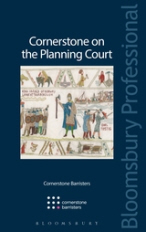Book Review: Cornerstone on the Planning Court
 The law moves on with increasing speed nowadays, one significant recent development being the creation of the Planning Court in April 2014. That is already two years ago now, so Cornerstone obviously felt the time was right to start putting together this volume capturing two years of development in such an important area.
The law moves on with increasing speed nowadays, one significant recent development being the creation of the Planning Court in April 2014. That is already two years ago now, so Cornerstone obviously felt the time was right to start putting together this volume capturing two years of development in such an important area.
Planning practitioners know the importance of contested planning challenges, often with local feelings riding high, politicians actively engaged and substantial sums of money and public benefits all focussed on the judgment and its outcome.
Cornerstone Barristers are one of a select number of chambers who have become the “go to” people for dealing with public law challenges, and they have reinforced their position with this and other branded public law volumes for the practitioner. Edited and drawn together by Tom Cosgrove, this approaches the subject through eight chapters prepared by different members of chambers, with appendices containing statutory provisions, rules and forms.
The chapters follow an expected sequence, with subjects such as jurisdiction, preparing claims, resisting claims, powers, costs and jurisprudence, and of themselves are sufficient to provide some assurance for the practitioner who has just had a claim form land on their desk (or in their inbox) and is about to break the good news to their client. Indeed, a volume such as this could only be put out by spreading the burden of writing it among colleagues. It covers the ground thoroughly.
|
General Editor: Tom Cosgrove, Cornerstone Barristers Published by: Bloomsbury Professional Cost: £75 |
Despite Cornerstone’s best efforts, all is not plain sailing when dealing with planning law. The Planning Court is not a Court as such, but the rules define what constitutes a planning court claim and it is effectively a specialist list. As ever, there is still room for doubt and argument, of the type that has grown incrementally with the planning system, even to the extent of which cases should go in the list.
The planning system has always suffered from and developed through challenges, as well as legislation, and the advice, guidance and case law have expanded. The writer is betraying his age by virtue of the fact that the Encylopedia of Planning Law consisted of two volumes when he first consulted it, and no printed publication could provide him with a reliable draft of what were then known as Section 52 agreements. That is not the case now.
Although useful, the information in the appendices has to be treated as a starting point as legislation rarely stands still, and we have all grown used to having accurate current electronic information available to us on a device which fits comfortably in a bag, or even a pocket. That is a problem for any publisher of books.
The talk now is that artificial intelligence will be replacing some of lawyer’s functions in the near future and I would not bet against that. Such systems already exist in the health profession, and you can’t get more critical issues than saving life. However, this volume demonstrates the value of professional knowledge and expertise gathered from experience and case work, which Cornerstone is sharing with us. If you expect to be going anywhere near the Planning Court in the near future, this would be a useful guide. It would be even more useful if you weren’t expecting to, but were not there by choice!
David Holt is Lead Lawyer (Commercial Practice Group) at Suffolk Legal.
Want to be a book reviewer? Local Government Lawyer is looking for practitioners to review the latest legal titles as they are published. Instant fame (and free legal books) guaranteed. Please contact Derek Bedlow at derek.bedlow@localgovernmentlawyer.co.uk or 0207 239 4917 with details of your areas of interest.

